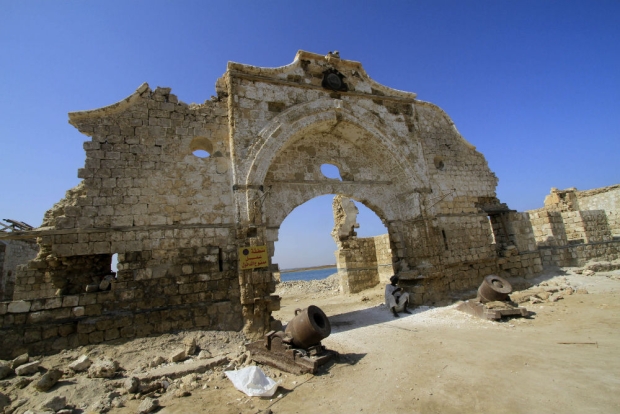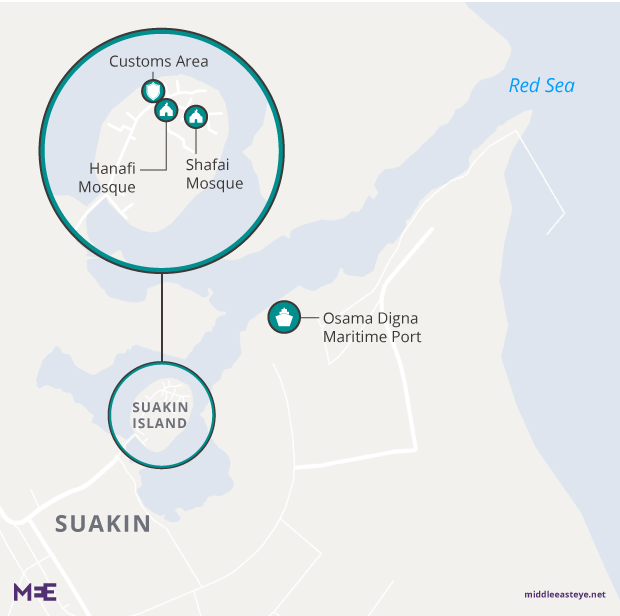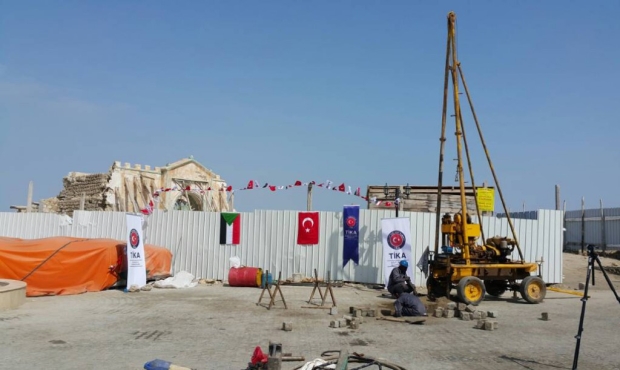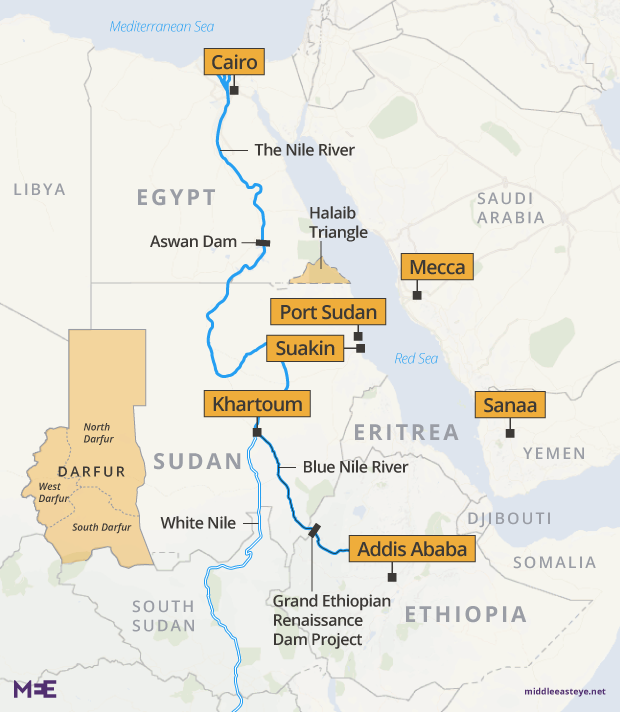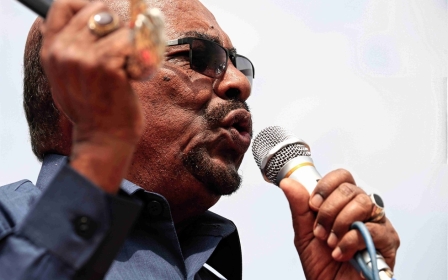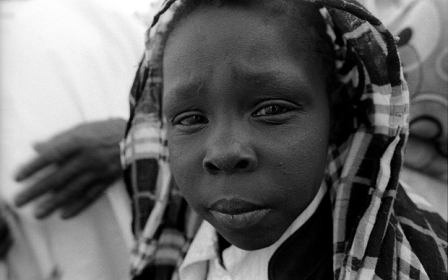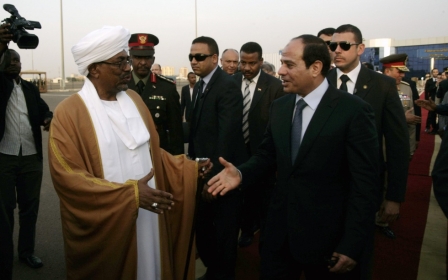Suakin: 'Forgotten' Sudanese island becomes focus for Red Sea rivalries
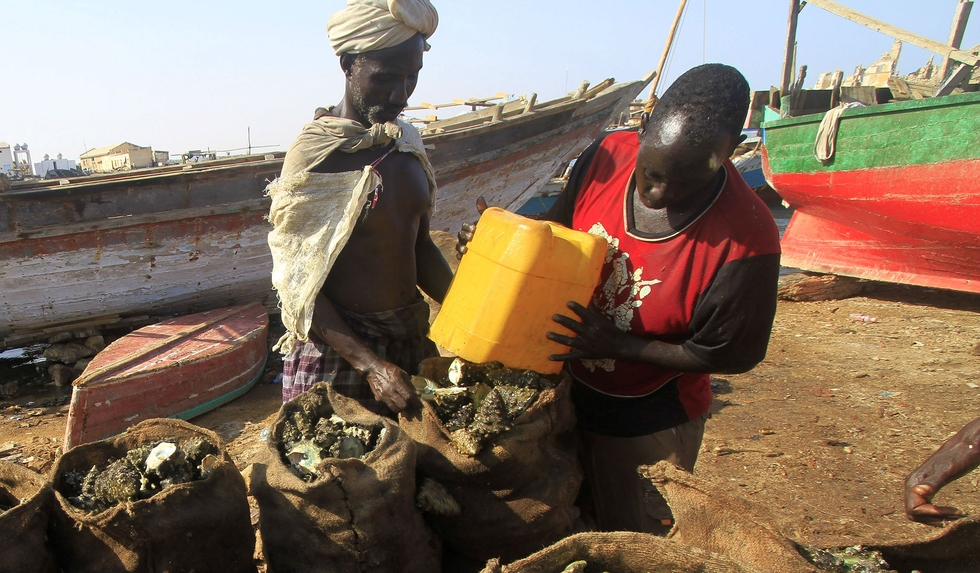
SUAKIN, Sudan – It is an historic yet long-neglected island whose proposed redevelopment has become the unlikely focus of a battle for influence in the Red Sea region.
A deal, announced in December and which saw the Ottoman-era port of Suakin leased to Turkey for 99 years to be revived as a tourism hub for Hajj-bound pilgrims, has set off alarm bells in Saudi Arabia and Egypt.
Riyadh and its allies have scrambled to counter what they see as a move by Ankara to extend its influence amid increasingly bitter regional rivalries, with the Sudanese government seeking to play each side off against the other in a bid to attract investment in its ailing economy.
While local officials have welcomed the deal with Turkey, some of Suakin's residents have vowed to resist a regeneration plan which they say was agreed without any consultation and threatens their "historical rights" to the island.
Others spoken to by Middle East Eye this month remained largely unaware of Turkey's plans for Suakin island and pleaded instead for investment in basic infrastructure in neighbouring mainland communities still lacking paved roads, reliable supplies of electricity and clean water, and adequate public facilities.
The town's only public hospital predates Sudan's independence in 1956 and many among Suakin's 50,000 residents complain that Suakin has been deliberately neglected for decades by central governments in Khartoum, which have favoured investment in Port Sudan, the capital of Red Sea State 50 kilometres to the north and which is now home to about half a million people.
Docking his small wooden fishing boat, Adam Ali Oshiek said life in Suakin was far from easy.
He told MEE that his daily catch usually earned him between 60 and 90 Sudanese pounds ($2-$3) at the local market, where his customers were mostly passengers and crew from the ferries and commercial shipping that plied the route to the Saudi port of Jeddah.
"I'm living on only one to three dollars a day, and actually this is the level of income for the majority of the people living in the city. Even the workers in the seaport are living on less than that," Oshiek said.
Osman Baksair, the owner of one of the few hotels in Suakin, told MEE that his business was also dependent on the shipping industry, and on travellers and traders making the crossing between Sudan and Saudi Arabia. He said he would welcome anything that brought tourism, investment and job opportunities to Suakin.
"Our income doubles during the Hajj season, as thousands of people come and go and that expands the market," Baksair said. "This has been a forgotten city for too long."
Baksair's optimism is echoed by Hashim Abu Fatima, Suakin's mayor, who told MEE that he expected the regeneration of the island, which is being managed by Turkey's state-run Turkish Cooperation and Coordination (TIKA) aid agency, to bring many benefits for local residents.
According to TIKA's website, the project will involve renovating the island's two Ottoman-era mosques, which are believed to date from the 16th century, as well as an old customs building.
Other locals are still to be persuaded.
Abdallah Musa, a political activist in eastern Sudan and a landowner in Suakin, accused the government in Khartoum of behaving irresponsibly by agreeing to hand over control to Turkey without consulting or notifying residents in advance.
"This is our historical land. This irresponsibility of the government by giving it to some foreigners without consultation with the owners of the land will lead to wide resistance," Musa told MEE.
"We are now gathering ourselves as owners, and we will go to court to guarantee our rights. Otherwise, we will consider other options to resist this move."
Control of Suakin island, which was settled by the Beja people of east Africa more than 1,000 years ago, has been fought over by rival regional powers for much of its history, according to Mohamed Nour Hadab, a local historian.
Under Turkish control from the 16th century, the 20-square-kilometre island, which is reached by ship via a narrow inlet from the Red Sea and has been connected to the mainland since the 19th century by a causeway, provided a naval base from which to protect the Ottoman province of Hijaz, now the west coast of Saudi Arabia, from attack.
For centuries it was the main port used by African Muslims travelling to Mecca.
Colonisation by the Turks was followed by periods of Egyptian and British rule in the 19th and 20th centuries. But once-grand trading warehouses and crenellated harbour-front buildings now stand derelict.
“Suakin was historically a cosmopolitan city, ruled by different invaders and drawing traders from Yemen, Saudi Arabia, Eritrea and elsewhere. Many of them ended up settling here,” Hadab told MEE.
Suakin's heyday now belongs to the distant past, its strategic and commercial importance superseded in the 20th century by the growth of Port Sudan.But with Turkey also agreeing deals with Sudan to rebuild and expand docking facilities at Suakin's modern port, and to establish a military presence further up the coast in Port Sudan, access to Sudan's coastline has once again become the subject of international competition.
The agreement with Turkey will see Turkish forces maintaining a presence in Sudan in order to fight militancy in the Horn of Africa region.
Turkish military and police will also train their Sudanese counterparts in counter-terrorism and build a vessels maintenance centre in Port Sudan.
Announcing the Suakin agreement in December, Sudanese Foreign Minister Ibrahim Ghandour told reporters that Turkey would "build a dock to maintain civilian and military vessels" and said the deal could "result in any kind of military cooperation".
Egyptian media subsequently reported that Turkey secretly planned to establish a military base on Suakin, while Saudi Arabia's ambassador in Khartoum announced that Riyadh had its own plans to build new ports on Sudan's coast and to increase bilateral trade.
Emirati and Egyptian interest
Meanwhile, Egyptian and Emirati investors are seeking to establish a commercial foothold in Suakin itself, according to Mohammed Basharaik, who owns substantial land on the island.
"We have been contacted by Egyptian and Emirati investors through some brokers, expressing their interest to buy or lease our lands to build some small tourism projects on the island," Basharaik revealed to MEE.
Irfan Neziroglu, Turkey's ambassador in Khartoum, told MEE that Ankara had no interest in harming any other country in the region and said that reports of Turkish military expansionism were "rumours" intended to sabotage improving relations between Turkey and Sudan.
"Suakin is a small island and its area doesn't technically allow for establishing a military base. We are only planning with the government of Sudan to transform the area into a cultural and tourism centre, and that much is known to everybody," said Neziroglu.
Alabas Alamin, a Sudanese security expert, told MEE that interest in Turkey's plans for Suakin had also been heightened by Saudi Arabia's months-long blockade of neighbouring Qatar, a dispute in which Egypt and the UAE have backed Riyadh, while Turkey has sided with Qatar.
"Sudan's government is jumping from one camp to another in order to serve its interests and solve its hard economic crisis, but that could lead to serious consequences in the future," said Alamin.
"The leasing of Suakin to Turkey in such a polarised regional atmosphere has raised widespread suspicions, but in the end Sudan has rights of sovereignty over its own territories."
So far in Suakin there is little evidence of construction and redevelopment projects under way. Turkish workers have arrived with equipment, but they refused to talk to MEE, saying they were not authorised to speak to the media.A source inside the Red Sea state government, speaking on condition of anonymity, confirmed to MEE that 30 Turkish architects, engineers and restoration experts were already on site.
"Turkish experts have started the geo-physical explorations and survey studies on the ground in order to draw up the practical plans for the reconstruction of the area," he said.
Describing his vision for Suakin at a press conference in Khartoum in December, Turkish President Recep Tayyip Erdogan said the island would become a point of embarkation for Turkish pilgrims making their way to Mecca.
"Imagine, people from Turkey wishing to go on pilgrimage will come and visit the historical areas on Suakin Island," Erdogan told reporters.
For some however, the restoration of Suakin serves as little more than a distraction from the geopolitical tensions looming over eastern Sudan and the country's Red Sea coastline.
One Sudanese strategic analyst, who asked not to be named for security reasons, said the military build-up of competing interests posed a real threat to regional stability."Turkey and Egypt, as well as Ethiopia and Eritrea, all have ambitions along Sudan's Red Sea coast, and the situation needs to be handled with great sensitivity," he said.
Another potential flashpoint, he said, was the Halaib Triangle to the north, which is disputed by Cairo and Khartoum but has been militarily occupied by Egypt for the past two decades.
"Egypt already has a presence in the Halaib disputed area in the northern part of the Red Sea state, and now Turkey has a presence in Port Sudan and Suakin. That's really playing with fire," the analyst said.
New MEE newsletter: Jerusalem Dispatch
Sign up to get the latest insights and analysis on Israel-Palestine, alongside Turkey Unpacked and other MEE newsletters
Middle East Eye delivers independent and unrivalled coverage and analysis of the Middle East, North Africa and beyond. To learn more about republishing this content and the associated fees, please fill out this form. More about MEE can be found here.


